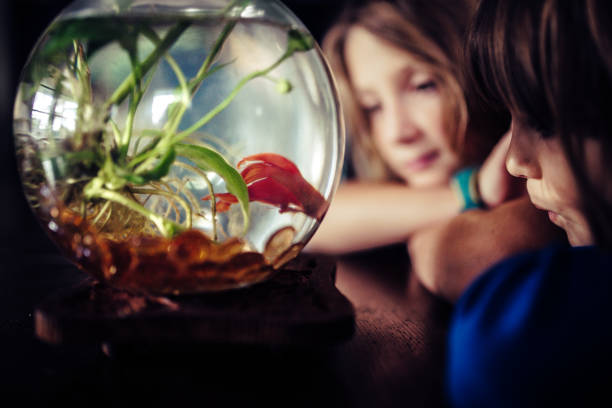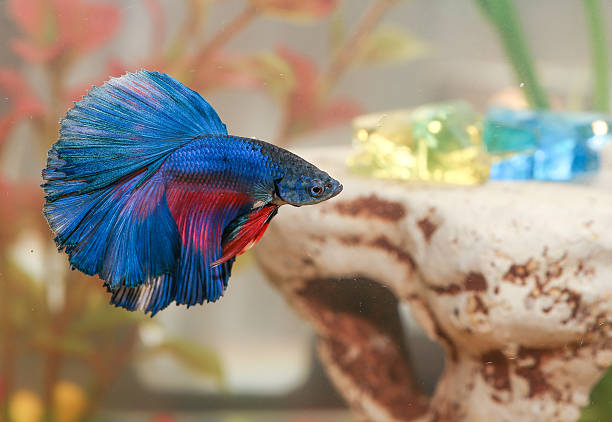Are Betta Fish Good Pets: Pros and Cons
Betta fish, also known as the Siamese fighting fish, are beautiful and fascinating. They have a long, silvery body with black, vertical stripes on their sides. They live in small groups and usually eat bloodworms, brine shrimp, tubifex worms, or flakes. They are very peaceful and can be kept with other fish of the same size.
With that said, betta fish are quite good pets. They are very active and playful, and they can be easy to care for. Betta fish are among the most popular aquarium fish. Betta fish can be easily kept in a small home aquarium with an average-sized tank, and they can provide the owner with hours of fun, enjoyment, and entertainment.
Betta fish come in a variety of different colors, so you will be able to find something that suits your style. If you’re looking for a great starter pet, a betta fish is an excellent choice.

Table of Contents
How Do Betta Fish Behave as Pets?
Betta fish are one of the most popular choices for pets because they are easy to care for and come in a variety of colors, sizes, and shapes. In addition, betta fish are very friendly fishes that enjoy being around people. They will usually get along well with other household pets if introduced properly but should be kept away from aggressive animals or children who might try to pick them up or squish them. While it is a topic of debate among Betta fish owners and experts, some observations suggest that Betta fish loves music, as they have been observed displaying increased activity and responsiveness when exposed to certain melodies. However, it is important to remember that individual preferences can vary, and not all Betta fish may have the same affinity for music.
What Makes Betta Fish Good Pets?
Budget-Friendly
Betta fish are one of the less expensive freshwater fish, so they can be a cost-effective option if you’re looking for a pet that doesn’t require much care. Betta fish are common in pet stores and typically cost between $5 and $10 per fish, which is a relatively low price for a pet that can provide hours of entertainment and pleasure. With proper care, betta fish are generally healthy and will not require much in the way of veterinary care. If you do encounter a problem with your betta fish, however, there are many ways to treat it without having to take him or her to the vet.
Low Maintenance
Betta fish are very easy to care for. They require minimal water changes and do not need any special dietary requirements. If you’re new to aquariums, betta fish make a great option because they are relatively simple to keep and low-maintenance overall. In addition, they are not picky eaters and will accept most foods.
Adaptive to Tank Size
Betta fish are relatively tolerant of different water conditions, which makes them adaptable to a variety of tank sizes/gallons. They can be kept in small tanks or large ones, as long as the tank has sufficient space for them and they have access to swimming areas and hiding places. In simpler terms, betta fish can be kept in a small space, making them a good choice if you’re limited on space.
Requires Minimal Supervision
Betta fish do not require a lot of attention. If you’re able to leave your betta fish home alone, he or she will be fine. However, if you find that you can’t let your betta go without supervision, it’s always a good idea to have some plans set up regarding the schedule of feeding, light exposure, and water changes so that the pet can still live a happy life should something happen while you’re away.
Aesthetically Pleasing
Betta fish are beautiful and interesting creatures, and they make great additions to any home aquarium. They come in a variety of colors, and many people enjoy keeping them as pets because of their personalities. If you’re looking for an easy fish to care for that will add style and excitement to your home aquarium, betta fish are the perfect option.
Friendly and Active
Betta fish are among the most friendly freshwater fish available. They are active but not overly so, so they make great household pets. In addition, they are quite easy to care for and are not picky eaters – most betta foods will work just fine in their diet. If you’re looking for a fish that is both active and easy to take care of, a betta fish may be the perfect choice for you!
Added Home Decorations
Betta fish come in a variety of colors and species, so they can be blended seamlessly into almost any home aquarium. They are also some of the friendliest fish available, making them perfect for those who want an easy-to-care-for pet that is still fun to have around. If you’re looking for an interesting addition to your aquarium or home that will provide hours of entertainment, betta fish should be at the top of your list.

What Can Make Betta Fish Upset as Pets?
One of the most common things that can make your betta pet unhappy is if their water changes too abruptly. Too much or too little carbon dioxide, oxygen levels, and nutrient levels can all be factored in causing a fish to become upset. Additionally, sudden changes in light intensity or temperature may cause harm as well. If you notice any signs of distress from your betta fish – such as refusing to eat or displaying unusual behavior – take him or her to a qualified fish expert for a check-up and appropriate treatment.
What Are the Downsides of Owning Betta Fish?
There are a few potential cons to owning a betta fish, though in most cases these should not be too big of an issue. Here are some considerations when it comes to keeping betta fish as pets:
Betta Equipment Investment
One of the potential cons to owning a betta fish is the initial investment required to provide them with the proper environment and dietary needs. This can be quite costly, especially if you don’t have any experience caring for tropical fish. Additionally, some people feel that it’s not worth spending money on something that they may only keep for a short period – which could be an issue if your betta dies before you’re able to properly care for him or her.
Aquarium Maintenance
One of the potential cons to owning a betta fish is that they require regular fish tank maintenance. Bettas are carnivorous fish and as such need a varied diet that includes both live and frozen foods. If your home doesn’t have access to these types of items, you may need to purchase them separately – an expense that some people feel isn’t worth the hassle. Additionally, bettas can be susceptible to diseases if their water isn’t kept clean. If you have a community tank, be sure to monitor the water levels and clean the filter regularly to prevent health issues from occurring.
Picky as Tankmates
One of the potential cons to owning a betta fish is that they are surprisingly picky when it comes to tankmates. They should be kept with only gentle fish that they can trust not to harm them, and some people find it difficult to find suitable companions for their bettas. If you’re looking for a pet fish, it may be better to consider one of the many other options available on the market.
Short Lifespan
Another potential downside to owning a betta fish is that they have a short life span. Bettas generally live for around 2-5 years, but this can vary depending on their health and environment. If you’re not able to properly care for your betta, he or she may die before reaching maturity – which could be an issue if you were hoping to keep him or her as a pet permanently.
Home Environment
Bettas are tropical fish – meaning that they require warm water temperatures (around 75-80 degrees Fahrenheit) to thrive. If your home doesn’t have the proper environment for this type of fish, then it may be best to consider another option. Additionally, bettas are predatory fish and as such require a varied diet that includes both live and frozen foods. If your home doesn’t have access to these types of items, then you may need to purchase them separately – an expense that some people feel isn’t worth the hassle.
Daily Feeding
Betta fish is that they require feeding daily. Bettas are carnivorous fish and as such require a diet consisting of both live and frozen foods. Some people find this task to be difficult, while others find it simple. If you’re not comfortable feeding your betta daily, then he or she may become stressed and potentially unhealthy.